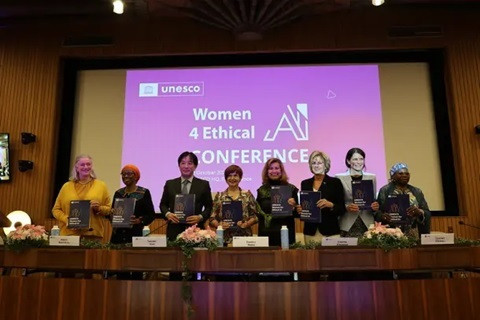

This event was a vital component of UNESCO's mission to implement the gender chapter of the Recommendation on the Ethics of AI, the only international framework that includes a dedicated chapter on gender. The focus was on integrating gender perspectives into all aspects of AI systems, ensuring that ethical AI development supports gender equality.
Co-chaired by Alessandra Sala and UNESCO's Assistant Director-General for Social and Human Sciences, Gabriela Ramos, the W4EAI platform has convened a diverse group of female experts and has been at the forefront of advocating for gender equality in technology since its inception during CSW63.
The W4EAI Conference featured in-depth discussions on how AI technologies can either reinforce or dismantle existing gender biases, including sessions on: boosting female representation in AI; addressing gender stereotypes in generative AI; tackling data inequality and understanding how gender biases in data sets can skew AI outcomes; and breaking barriers for women in tech, among many other topics.
A dedicated session highlighted UNESCO’s Readiness Assessment Methodology (RAM) and how it integrates a gender perspective to ensure that AI policies and strategies are inclusive and equitable. Experts shared insights on the development of RAM in different regional contexts, exploring how aligning readiness assessments with ethical AI guidelines could contribute to closing gender gaps and fostering more inclusive digital ecosystems. This session demonstrated how a gender-focused RAM can guide nations toward more equitable AI frameworks that prioritize ethical and inclusive practices.
A highlight of the event was the presentation of the W4EAI Gender Outlook Study, which offered fresh insights and actionable data on the intersection of gender and AI development. The outlook revealed a significant gap: current AI policy frameworks often fail to prioritize gender. While AI governance has been a hot topic in recent years, most global analyses don’t fully consider gender dimensions. The study showed that most countries haven’t addressed gender equality in their AI policies—and those that have are often only scratching the surface.

"Without a robust, cross-cutting gender focus, AI policies are unlikely to make significant progress in supporting equitable AI development for all. Improving gender equality in and through AI is far more complex than simply applying technical solutions. It requires a solid political commitment from governments and organizations, along with targeted efforts, concrete actions, and dedicated budgets to drive the structural changes necessary for true gender equality in the AI field."
Gabriela Ramos, Assistant Director-General for Social and Human Sciences
During the event, Gabriela Ramos also signed a letter of intent with The Adecco Group, establishing a strategic collaboration to advance gender inclusion and equality in the labor market, particularly through the responsible use of artificial intelligence. This partnership seeks to address persistent challenges faced by women in the workforce, promoting an ethical and human-centered approach to integrating emerging technologies.
The Women4Ethical AI Conference was more than just a one-day event. It laid the foundation for an ongoing, transformative effort under the W4EAI platform to ensure that gender equality becomes an integral part of AI development and governance. This initiative aligns with UNESCO's larger commitment to the ethical development of AI and represents a crucial step toward creating technologies that serve everyone equally.
It paved the way for a future where AI not only promotes gender equality but also empowers women worldwide.
Stay tuned for impactful, forward-thinking solutions as we build a more inclusive and gender-balanced future in AI.
